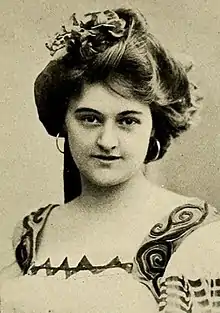Helen Bertram | |
|---|---|
 Helen Bertram, from a 1901 publication. | |
| Born | Lula May Burt August 30, 1865 (or 1869) Tuscola, Illinois, U.S. |
| Died | September 24, 1953 Los Angeles, California, U.S. |
| Nationality | American |
| Occupation(s) | Actress, singer in light opera, vaudeville |

Helen Bertram (born Lulu May Burt; August 30, 1865 – September 24, 1953) was an American actress and singer in comic opera and musical theatre. She was also known for her tumultuous private life.
Early life
Lula May Burt[1] was born in 1865 (some sources give 1869)[2] in Tuscola, Illinois,[3] the daughter of William Neal Burt and Caroline Burr Burt.[4] She was raised in Paris, Illinois and in Indianapolis, Indiana. She studied voice with Tecla Vigna[5] at the Cincinnati Conservatory of Music.[6]
Career
Bertram sang in comic opera[7] with the Emma Abbott Opera Company, the Heinrich Conried Opera Company, the Bostonians, the McCaull Comic Opera Company, Henry E. Abbey's English Opera Company, and the Carl Rosa Opera Company. Her roles included Selena in Mignon, Serpolette in The Chimes of Normandy, Arline in The Bohemian Girl, Adalgisa in Norma, Prince Julius in The King's Fool, Farina in The Tar and the Tartar (for which she danced barefoot),[8] and Stella in Clover.[9][5]
On Broadway, she appeared in musicals Robin Hood (1900), The Viceroy (1900), Foxy Quiller (1900), The Prince of Pilsen (1903), The Gingerbread Man (1905-1906), The Land of Nod and the Song Birds (1907), and again in Robin Hood (1932). Bertram appeared in two films, The Lightning Conductor (1914), a silent picture which included her daughter in the cast, and Rhythm on the River (1940), with Bing Crosby and Mary Martin. She also appeared in vaudeville shows.[10]
She and her daughter were both active in the suffrage movement in Los Angeles.[11]
Personal life
Events in Helen Bertram's private life were regularly detailed in newspapers, including adultery, divorce, embezzlement, and bankruptcy.[12][13] Among her reported eccentricities, she wore a gold locket or chamois pouch containing her second husband's ashes, for several years after his death.[14][15][16]
Bertram married three times, to Italian musician Achille Tomasi (from 1888 to 1894), English actor Edward J. Henley, a younger brother of poet William Ernest Henley (from 1894 to 1897), and English actor Edward J. Morgan (from 1903 to his death in 1906).[14][17] She divorced Tomasi; her other two husbands died.[18] She had one daughter with Tomasi, actress and screenwriter Rosina Henley (1890-1978), who took and kept her stepfather's name;[19] Rosina Henley married British film director Harley Knoles. Bertram moved to Los Angeles in 1910.[20] Helen Bertram died in 1953 in Los Angeles.
References
- ↑ Stuart Fraser, "A Rose by Any Other" Green Book Magazine (March 1913): 519.
- ↑ John William Leonard, Woman's Who's who of America (American Commonwealth Publishing 1914): 97.
- ↑ Walter Browne, E. De Roy Koch, eds., Who's Who on the Stage (Dodge 1908): 41.
- ↑ A. D. Storms, Players Blue Book (1901): 107. via HathiTrust

- 1 2 "Our Gallery of Players: XIV. Helen Bertram" The Illustrated American (October 3, 1891): 298.
- ↑ "Topics in Chronicling America: Helen Bertram, Prima Donna of Comic Opera Led Scandalous Life Off-stage" Newspaper & Current Periodical Reading Room, Library of Congress.
- ↑ "Rival Queens of Light Opera Are Here for the Season" St. Louis Republic (May 25, 1901): 7. via Newspapers.com
- ↑ David K. Hildebrand and Elizabeth M. Schaaf, Musical Maryland: A History of Song and Performance from the Colonial Period to the Age of Radio (JHU Press 2017): 110. ISBN 9781421422404
- ↑ David S. Shields, "Helen Bertram" Broadway Photographs.
- ↑ "Vaudeville Folk Surely Did Their Best With Jokes Off the Ice on a Hot Day" St. Louis Post-Dispatch (August 19, 1908): 5. via Newspapers.com
- ↑ "Actresses Will Help Suffrage Movement" Los Angeles Herald (October 17, 1910): 10. via California Digital Newspaper Collection

- ↑ "Impresario Jailed" The Topeka Daily Herald (February 23, 1903): 6. via Newspapers.com
- ↑ "Helen Bertram in Court" New York Times (August 4, 1905): 12. via ProQuest
- 1 2 "Morgan and Helen" Town Talk (October 17, 1903): 27.
- ↑ "Drama of a Dead Man's Ashes" The San Francisco Examiner (May 6, 1900): 27. via Newspapers.com
- ↑ "Devoted in Death" LeCompton Sun (March 31, 1899): 3. via Newspapers.com
- ↑ "Players Secretly Married" New York Times (October 7, 1903): 9. via NewspaperArchive.com
- ↑ "Actor Dies Suddenly" Detroit Free Press (March 11, 1906): 3. via Newspapers.com
- ↑ "Believed to be Insane" San Francisco Chronicle (November 12, 1896): 1. via Newspapers.com
- ↑ "Plays Cook in Own Home" The Los Angeles Times (August 28, 1910): 20. via Newspapers.com
External links
- Helen Bertram at IMDb
- Helen Bertram at the Internet Broadway Database
- Helen Bertram in the Library of Congress Newspaper Archives
- A cigarette card featuring Helen Bertram, in the George Arents Collection, New York Public Library Digital Collections.